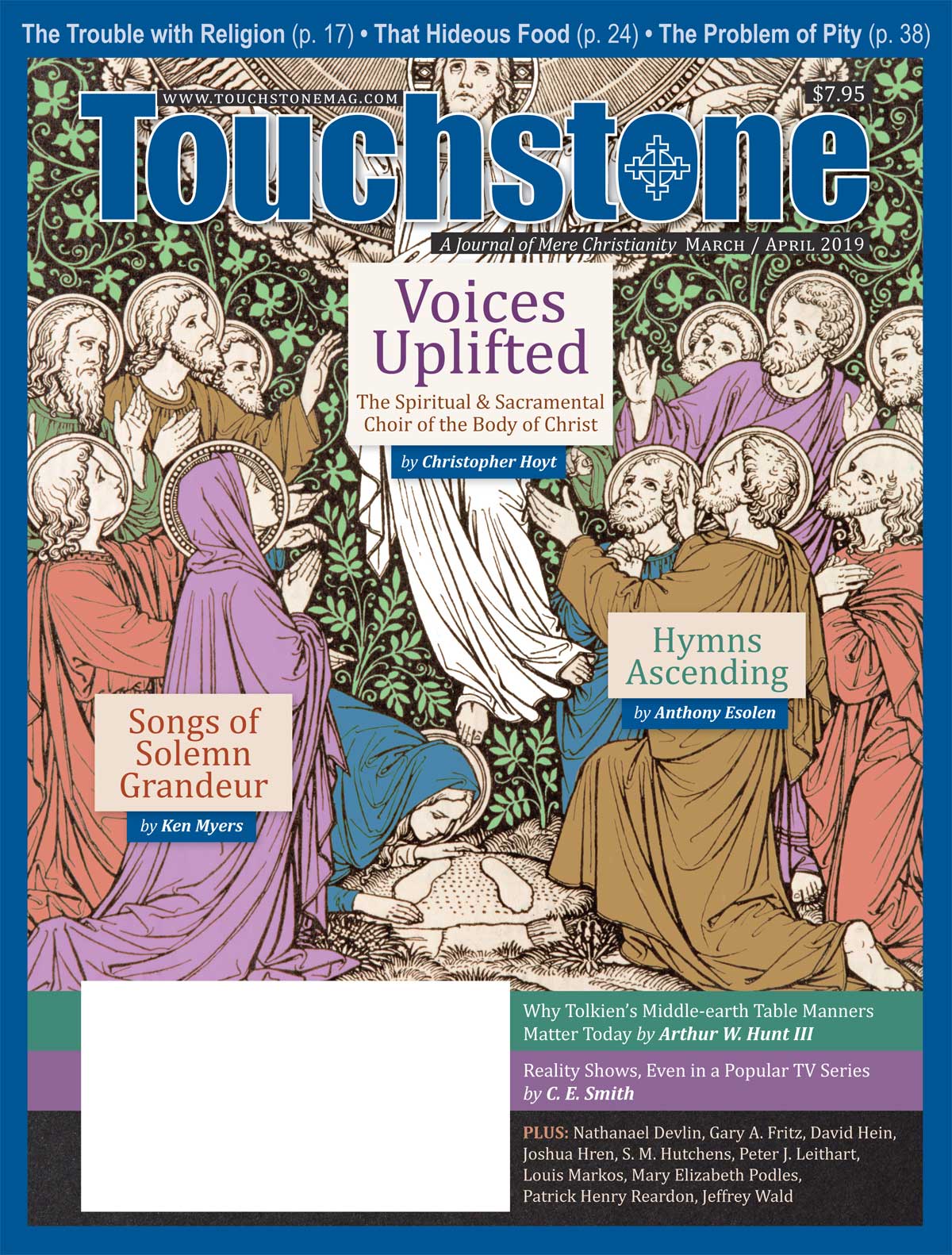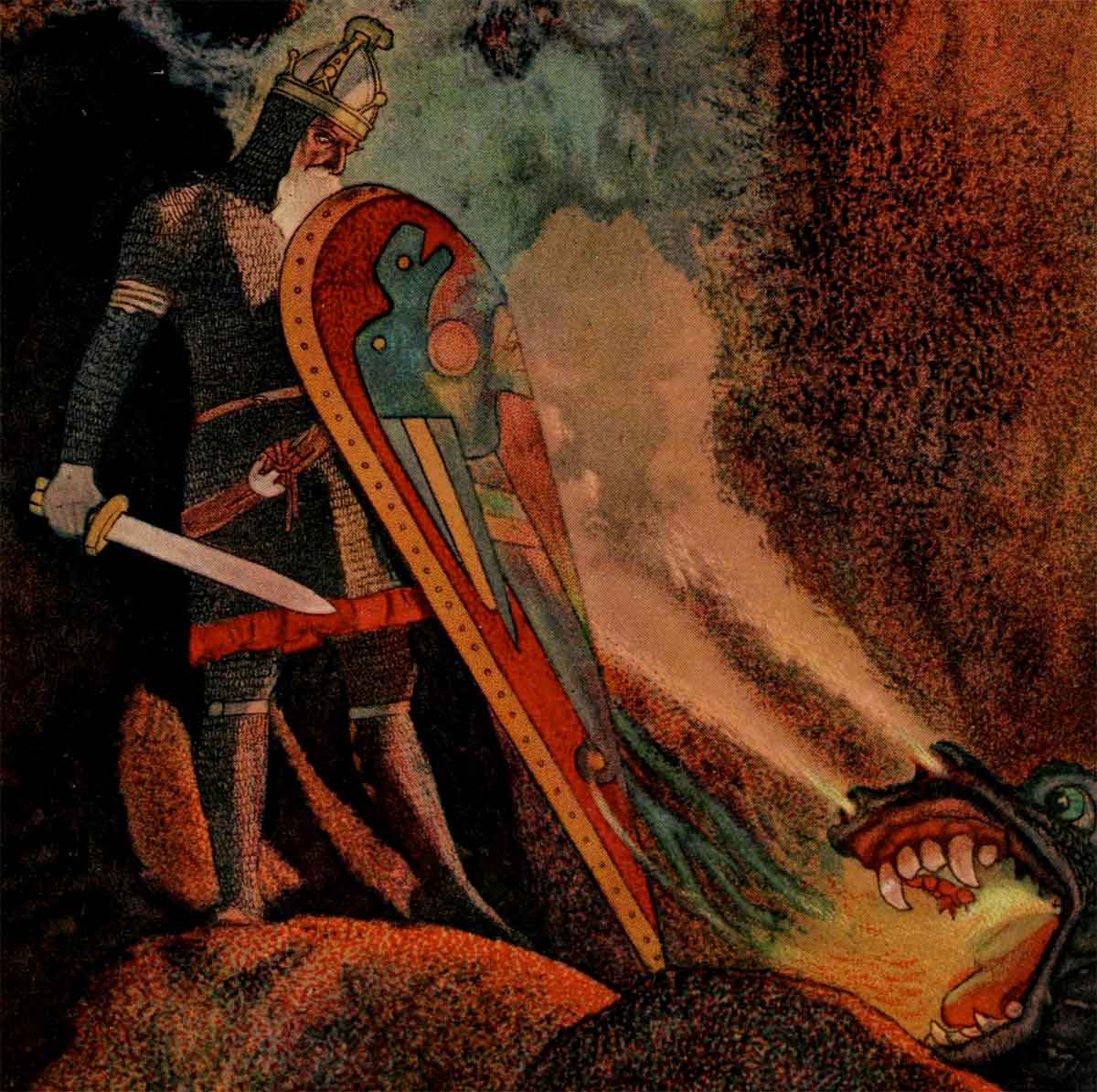Feature
The Mimetic Bachelor
Reality Shows, Even in a Popular TV Series
by C. E. Smith
On TV's wildly popular reality show The Bachelor, twenty-five women compete for the title character's hand in marriage while each week he pares down the number of potential wives in a ceremonial distribution of roses. Its sister program, The Bachelorette, replicates the narrative format and dating rituals but with the sex dynamic reversed, a difference that, if nothing else, increases the likelihood of fistfights. The confined process of elimination resembles a locked-room mystery but with polyamory rather than homicide as the focus. It is a crass spectacle worthy of Kierkegaard's observation that "what the world honors and loves under the name of love is group-selfishness."
I'm sufficiently inured to primetime vulgarity that I can neither recommend The Bachelor nor continue to blame my wife for making me watch it. But my initial disgust with the show has given way to amused tolerance and even curiosity, not least because of its remarkable compatibility with the biblical anthropology of French theorist René Girard.
Girard's central idea is that all human desire is imitative, or mimetic. Mimetic desire is responsible for the inflation of any object's value beyond its intrinsic worth, as we might see in fashion trends, exorbitant art sales, or obsessions with brand names or celebrities. Mimetic desire explains the problem of "keeping up with the Joneses" and the tendency of small children to break into sudden fights over previously neglected toys. It can also be said to account for The Bachelor, not just its enormous popularity but also its very premise—the irrational desire of twenty-five women for the same man.
Mimetic desire leads to conflict when two or more individuals lay claim to the same object and, through imitation, reinforce one another's desire for it in a cycle of escalating intensity. Among the earliest human communities, which lacked any kind of legal or institutional restraints, an inevitable crisis such as a food shortage or plague had the potential for a catastrophic "war of all against all." No such community could have survived its own violence without channeling that violence onto a single victim in a spontaneous process Girard calls the scapegoat mechanism. The war of all against all had to become a war of all against one.
For the scapegoat mechanism to occur, mimetic rivals must become so consumed by hatred for each other as to lose sight of their original object of desire. Acquisitive mimesis, which is focused on the desired object, devolves into conflictual mimesis, or mimetic hatred. As hatred grows, it suppresses any differences in status or personality that might have existed between the antagonists. They become interchangeable doubles, each resembling not just the other but also the participants of neighboring rivalries. This allows for the substitution of enemies and formation of alliances.
As conflictual mimesis spreads like a contagion, individuals attempt to differentiate themselves by means of increasingly flamboyant accusations. A particularly egregious crime, whether true or not, has the potential to attract the condemnation of others, so participants in unrelated conflicts might find common cause in shared disdain. A coalition gains mimetic force with each new member—its appeal being based on the number of participants and the moral offense of its target—and rivalries coalesce in self-perpetuating fashion until the community is united or nearly united against a single enemy. The hapless figure who emerges as the scapegoat does so either at random or as the result of some distinguishing trait, such as a limp, left-handedness, foreign origin, or a lack of any close relative to defend him against outrageous accusations.
In every season of The Bachelor, a group of contestants forms a coalition against a single rival, a woman who initially sets herself apart by monopolizing the bachelor's time in private conversation and depriving others of opportunities to prove themselves worthy of roses. Her audacity arouses suspicions of guile and the inevitable accusation of being on the show "for the wrong reasons," perhaps for the advancement of her acting career rather than love and marriage.
The other contestants hesitate at first to revile her in the presence of the bachelor, but it isn't long before one of them decides to throw the first stone by divulging the reasons for their collective rancor. Never does the bachelor reward outright slander, even if he's proven his gullibility and poor judgment by giving roses to someone so objectionable, but in the mind of the slanderer, hatred of the rival outweighs her desire for the bachelor. Conflictual mimesis has replaced acquisitive mimesis. She is now likely to be eliminated even sooner than the scapegoat, but she has no excuse after having seen the same mistake played out in every previous iteration of the show.
The Basis of Polytheistic Religion
The Bachelor sustains conflict by means of an artificial shortage of sexual partners. Similar shortages in the prehistoric world catalyzed innumerable mimetic crises and collective murders. In the aftermath of a scapegoating event, the primitive community responsible for it experienced profound tranquility as former rivals reconciled under a common cause. The radical transformation from chaos to peace struck the people as so abrupt and so powerful that only a supernatural explanation would suffice. The supposed malefactor whose putative crimes were the source of all the community's ills now, in immediate hindsight, became the opposite, a deity responsible for the community's unity and peace. Humans didn't invent their gods, Girard says in I See Satan Fall Like Lightning: they deified their victims.
C. E. Smith is a radiologist and author of the novella Rex.
subscription options
Order
Print/Online Subscription

Get six issues (one year) of Touchstone PLUS full online access including pdf downloads for only $39.95. That's only $3.34 per month!
Order
Online Only
Subscription

Get a one-year full-access subscription to the Touchstone online archives for only $19.95. That's only $1.66 per month!
bulk subscriptions
Order Touchstone subscriptions in bulk and save $10 per sub! Each subscription includes 6 issues of Touchstone plus full online access to touchstonemag.com—including archives, videos, and pdf downloads of recent issues for only $29.95 each! Great for churches or study groups.
Transactions will be processed on a secure server.
more on culture from the online archives
more from the online archives

33.1—January/February 2020
Do You Know Your Child’s Doctor?
The Politicization of Pediatrics in America by Alexander F. C. Webster
calling all readers
Please Donate
"There are magazines worth reading but few worth saving . . . Touchstone is just such a magazine."
—Alice von Hildebrand
"Here we do not concede one square millimeter of territory to falsehood, folly, contemporary sentimentality, or fashion. We speak the truth, and let God be our judge. . . . Touchstone is the one committedly Christian conservative journal."
—Anthony Esolen, Touchstone senior editor













